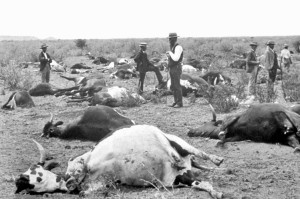FAO lifts moratorium on using rinderpest for approved research
A moratorium on using live rinderpest virus for approved research has been lifted by the Food and Agriculture Organization of the United Nations and the World Organisation for Animal Health (OIE).
The moratorium followed the adoption of a Resolution in May 2011 by all OIE Member Countries that urged members to forbid the manipulation of rinderpest virus containing material unless approved by the Veterinary Authority and by FAO and OIE.
The two organizations have now put in place strict criteria and procedures to follow in order to obtain official approval for any research proposals using rinderpest virus and rinderpest virus-containing materials.
One of the most crucial requirements is that the research should have significant potential to improve food security by reducing the risk of a reoccurrence of the disease. This procedure replaces an earlier complete ban on handling the virus.
Rinderpest was formally declared eradicated in 2011, but stocks of rinderpest virus continue to exist in laboratories. In June 2012, a moratorium on handling the virus was imposed after an FAO-OIE survey found that the virus continues to be held in more than 40 laboratories worldwide, in some cases under inadequate levels of biosecurity and biosafety.
When rinderpest was officially eradicated, FAO and OIE member countries committed themselves to forbid the manipulation of rinderpest virus-containing material unless approved by the national veterinary authority as well as by FAO and OIE.
Need to remain vigilant against rinderpest
“While the global community succeeded in eradicating the rinderpest virus in nature, we need to keep a close eye on virus samples that remain in laboratories,” said Juan Lubroth, FAO’s Chief Veterinary Officer.
“Smallpox in humans was also eradicated more than 30 years ago, but smallpox too had to be painstakingly eliminated from laboratories worldwide until just two high-security locations remained,” Lubroth explained. “FAO is committed to assist countries in either destroying or securing any remaining rinderpest viruses held in laboratories to avoid any risks of their release into the natural environment.”
Read the rest of the FAO News Release
According to Iowa State University, Rinderpest is a highly contagious viral disease of livestock. It can cause illness in cloven-hooved (two-toed) animals, particularly cattle and buffalo. It is spread by direct contact and commonly causes death in infected animals.
Cattle and buffalo are most commonly affected. Outbreaks in these animals can approach death rates of 100%. Sheep and goats can develop disease but usually with less serious consequences.
Rinderpest is spread between animals by direct contact. The virus can be in secretions from the eyes, nose, or mouth, and the feces, urine, blood, milk, or reproductive fluids of infected animals. The virus may also be spread by fomites such as contaminated equipment, feed troughs and watering tanks.
Rinderpest infections can vary. Sick animals have a sudden onset of fever. Sores develop in the mouth, which will cause the animal to drool. Discharges from the nose and eyes will also be seen. Profuse, watery diarrhea, which may be bloody, occurs a few days after oral lesions develop. Animals may have severe abdominal pain, thirst and strain to defecate, have difficulty breathing, and progressive weakness until they can no longer stand. Death may occur suddenly or within 8-12 days; some animals may recover.
Rinderpest does not infect people.
Read: Transplanting Plum Island to Kansas: is the country’s food supply at risk?















